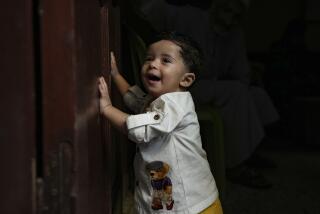Rocket Blast Near Baghdad Devastates an Iraqi Family
- Share via
BAGHDAD — The boy wrinkles his nose and looks from right to left refusing to believe what he sees: two white-bandaged stumps like white wings instead of his arms. Ali Ismail, 12, doesn’t recall the rocket that destroyed his house and killed most of his extended family. Nor does he fully understand that he is in a hospital, hours after doctors saved his life.
A distant relative bends over to scratch his nose. “Do you want something to eat or some water to drink?” she asks. “No,” said the boy, “I want my mum. When will she come?”
The rocket blast Sunday night shattered the village of Jisser Diala on the southern outskirts of Baghdad where 24 members of Ali’s family lived in a compound of four houses and a number of smaller shacks and cabins. Survivors said 14 of Ali’s relatives -- his mother, father, brother, cousins, aunts and uncles -- were killed and nine others injured. Ali’s cousin Thumer Mahsin, 31, was unscathed and supervised the burials.
On Tuesday, Mahsin, a farmer, returned to what used to be his house, now just piles of rubble. Mahsin walked around, picked up and examined a toy truck, a shoe, a cabinet drawer. He told a reporter he was not sure where he would sleep.
“They bomb this area every day,” Mahsin said. “I don’t know why they do it. But it went on every day, night and day too. And we got used to it. We slept in our houses every night. And it fell on Sunday night. There was this huge light, and the earth jumped under the house. I jumped up and then fell and then I felt something heavy lying on top of me, a piece of ceiling or something. When I crawled out, smoke was everywhere. You couldn’t see a thing.”
Then neighbors came with torches and water from the nearby canal and put out the fires and brought out his dead and injured relatives, he said.
Kerim Jasem, 42, a neighboring farmer, recalled that all the bodies they removed were covered with blood and dust. “It was difficult to tell who was alive and who was dead.”
U.S. officers say they don’t target civilians but acknowledge that some will be killed -- in part because Iraq has put weapons in population centers.
Jasem insisted that there is no military target in the vicinity. But close by, on the other side of a small canal, there was an antiaircraft battery, barely visible through the thick black smoke from oil fires that encircle the capital. As he talked, surrounded by his six grown sons, the guns began firing. Two bombs fell about 700 yards away, but nobody ducked. They are all used to it by now.
“It is nothing,” said Jasem. “Today is quiet. Sunday was a bad day. They bombed all day.”
Asked why they don’t move to safety, Jasem gave a sad chuckle. “It is our land. If Allah decides that we should die here like our neighbors, then we will die. If the Americans come here, we will fight them.”
The sense of war is vivid in the villages outside the capital. Roads are empty of vehicles, and few civilians move about among the soldiers and other loyalists in green military robes. The vast open fields have numerous fortifications with antiaircraft guns and large-caliber machine-gun emplacements.
The threat of violence is everywhere. On the road back to Baghdad, two old sedans blocked the way and several villagers with Kalashnikovs stopped a reporter’s car. They pointed the loaded rifles through the car windows, almost touching a passenger’s forehead. Their eyes were full of hatred. The youngest looked barely 16.
One of the men asked if there were Americans in the car. Told no, he looked dubious, then slightly relaxed.
“My sons and I will die here, but not let Americans into the city,” said the oldest man. Then he barked something to the others and they moved the blockade, allowing the car to go on to Baghdad, where the planes again were in the skies.
More to Read
Sign up for Essential California
The most important California stories and recommendations in your inbox every morning.
You may occasionally receive promotional content from the Los Angeles Times.













